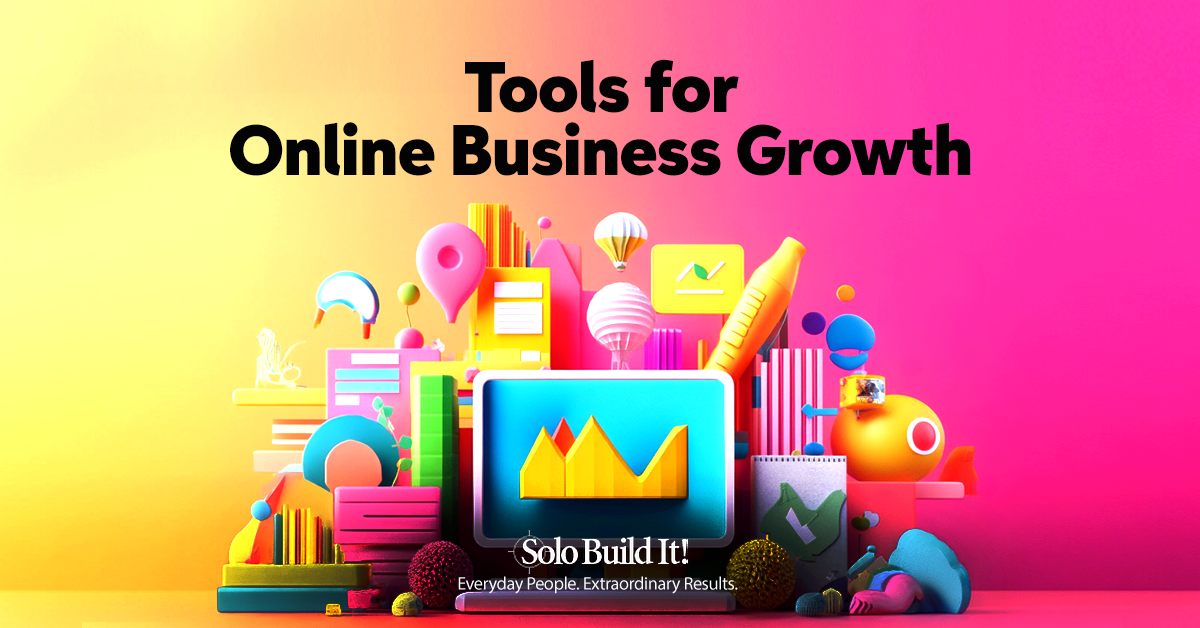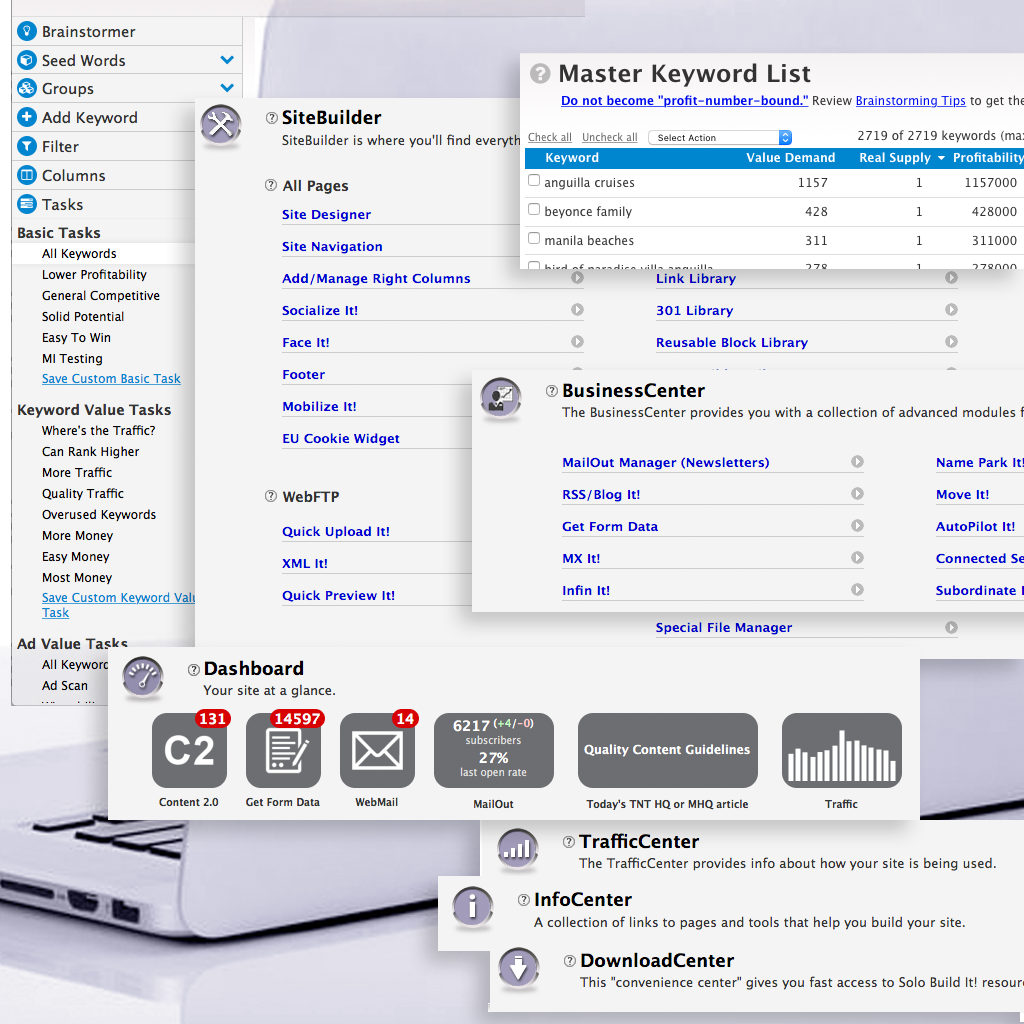
If you’re researching the best tools for online business, particularly in the age of artificial intelligence, this article will shorten your learning curve. Running an online business has become more achievable than ever, but to make it in today’s hyper-competitive landscape, having the right process and tools is key.
Must-Have Tools for Online Businesses
The following are essential for anyone starting an online business, regardless of its niche or target audience.
1. A Reliable Desktop or Laptop Computer
At the foundation of any online business is a dependable computer. It serves as your primary workstation, allowing you to access the internet, manage your business files, and run essential software for various tasks.
A laptop offers the added benefit of portability, enabling you to work from anywhere. This flexibility is particularly valuable for entrepreneurs who are constantly on the move or prefer to work from different locations.
While you likely already have a computer, it’s worth considering an upgrade if your current device is outdated or slow.
Click-to-Tweet: “A reliable laptop allows you to work from anywhere. Freedom = productivity!”
2. High-Speed Internet Connection
A fast and reliable internet connection is crucial for running an online business. It enables you to:
- Communicate effectively with clients and customers.
- Access important files and documents quickly.
- Stay connected with your target audience.
- Manage your website and online presence efficiently.
Consider investing in a business-grade internet package to ensure consistent connectivity.
3. Online Business Builder or Content Management System
Whether you choose an all-in-one platform or a sitebuilder where you piece together the tools and plugins you need, it’s important to conduct due diligence to make the right decision for your goals.

For example, Solo Build It! is an all-in-one business-building system, and WordPress is a content management system where you add the theme, a keyword research tool, plugins and software of your choosing. You’ll need to start with one or the other.
4. Keyword Research Tools For Online Business
A keyword research tool helps you identify what keywords and keyphrases people use to search for information in your niche. This assists you in:
- checking out the competitive landscape
- determining what keywords to write about
- planning how to monetize your business
For example, SBI!’s keyword research tool includes a site concept finder to help you determine the best niche to start a business around. The tool then identifies hundreds of keywords people use in search, and provides supply, demand and profitability numbers.
It uses Semrush’s powerful suite of APIs to ensure that the keyword research data is current and relevant.
There are many keyword research tools on the market. Just do a Google search and check out a few.
5. Smartphone With a Quality Camera
A smartphone is an indispensable tool for online business owners. It allows you to:
- Stay connected on the go.
- Capture high-quality images and videos of your products or services.
- Respond promptly to customer inquiries.
- Process payments on the move.
When choosing a smartphone for your business, prioritize models with high-quality cameras. Professional-looking photos and videos can significantly enhance your brand’s credibility and appeal to potential customers.
6. Email Marketing Software
Email marketing remains one of the most effective ways to engage customers and drive sales. With the right email marketing software, you can:
- Send targeted campaigns based on customer behavior and preferences.
- Automate your email marketing efforts.
- Segment your audience for more personalized communication.
- Track and analyze campaign performance.
Some popular email marketing tools include Mailchimp and AWeber.
Also Read: Email Marketing Funnel: How to Create Sales Funnels Via Email
7. Social Media Management Tools For Online Business Growth
Social media is a vital channel for promoting your online business and engaging with your audience. However, managing multiple social media accounts can be time-consuming.
A social media management tool can help you:
- Manage all your social media accounts from a single platform.
- Schedule posts in advance.
- Track performance metrics across different platforms.
Hootsuite, for instance, offers robust features for scheduling, automation, content curation, and social media monitoring, making it an excellent choice for businesses looking to establish a strong social media presence.
Time is money in the world of online business. Develop a strategy suited to your business and schedule your posts in advance.Click To Tweet8. Google Workspace
Google Workspace (formerly G Suite) is a comprehensive set of productivity and collaboration tools that can benefit your online business. It includes:
- Gmail (using your site’s domain name) for professional email communication
- Google Drive for cloud storage and file sharing
- Google Docs, Sheets, and Slides for document creation and collaboration
- Google Calendar for scheduling and time management
- Google Meet for video conferencing

This suite of tools can help you stay organized, collaborate effectively with team members, and manage your business operations more efficiently.
9. Cybersecurity Software
If you have an online store connected to your business, protecting it from cyber threats is crucial in today’s digital landscape. Cybersecurity software can help safeguard your business against:
- Malware and viruses
- Phishing attacks
- Data breaches
- Hacking attempts
Popular cybersecurity solutions include Norton, McAfee, and Kaspersky.
10. Customer Support Software
Providing excellent customer service is key to the success of any online business. If you prefer to outsource customer service, take a look at software-as-a-service companies like Helpdesk. Customer support software can help you:
- Manage customer inquiries efficiently.
- Track and resolve customer issues.
- Provide timely support across multiple channels.
Popular options in this category include Hiver, Zendesk, Freshdesk, and Help Scout.
Tools That Are Nice to Have, But Not Necessary
These tools will make your job easier, but they aren’t necessary to have at the beginning. You can start adding them as your business grows bigger.
1. Graphic Design Software
Creating visually appealing graphics for your website, social media, and marketing materials is essential for attracting and retaining customers.
Professional design software like Adobe Photoshop or Illustrator can be expensive. There are more affordable and user-friendly options available:
- Canva: A versatile, user-friendly graphic design tool with a wide range of templates and features suitable for beginners.
- GIMP: A free, open-source alternative to Photoshop with powerful image editing capabilities.
- Inkscape: A free vector graphics editor, similar to Adobe Illustrator.
These online tools can help you create professional-looking graphics without breaking the bank or requiring extensive design experience.
You don't need to be a pro designer to create stunning visuals for your business. Tools like Canva make it super simple!Click To Tweet2. Website Optimization Tools
If you have an online store, it needs to perform well in terms of speed and user experience. Website optimization tools like Google Analytics 4 can help you:
- Analyze your website’s performance and loading speed.
- Identify areas for improvement.
- Implement optimizations to enhance user experience.
3. eBook Selling Tool
If your online business involves selling digital products like eBooks, having a dedicated eBook selling tool is essential. This tool allows you to:
- Easily distribute your eBooks to your customers without the hassle of manual delivery.
- Protect your intellectual property with built-in security features that prevent unauthorized sharing.
- Manage transactions seamlessly, offering various payment gateways and tracking your sales.
Tools like Gumroad, SendOwl, and Payhip are popular choices for eBook sellers. They provide user-friendly platforms where you can upload your eBooks, set prices, and automate the sales process, freeing you to focus on creating more valuable content for your audience.
4. Online Courses Hosting Platform
Offering online courses is a fantastic way to monetize your expertise and build a community around your brand. An online courses platform helps you:
- Create and deliver engaging course content, from video lessons to downloadable resources.
- Manage student enrollments and progress, ensuring each learner has a personalized experience.
- Process payments and handle subscriptions, making it easy to scale your course offerings.
Platforms like Thinkific, Teachable, and Kajabi are excellent for setting up and managing online courses. They offer a range of features, including course creation tools, marketing options, and analytics to track student engagement.
Now You’re Ready to Run an Online Business
Starting an online business is much more affordable than launching a traditional brick-and-mortar store — and you can work on it from anywhere. With just a few essential tools, you can begin your entrepreneurial journey without the hefty overhead costs associated with a physical location.
Running a successful online business requires more than just a great product or service, though. It demands the right set of tools to manage various aspects of your operations efficiently.
While the initial investment in these tools may seem a bit daunting at first, remember they’re designed to save you time and resources in the long run. By automating repetitive tasks and streamlining your operations, these tools allow you to focus on more important aspects of your business, such as building your audience (traffic) monetization strategy, and cultivating long-term relationships.
As you embark on your online business journey or look to optimize your existing operations, consider investing in a comprehensive online business building solution like Solo Build It! (SBI!) or WordPress with SBI! for WP.
With the right platform and tools at your disposal, you’ll be well-equipped to navigate the challenges of the digital marketplace and build a thriving online business.
Also Read: Starting an Online Business Frequently Asked Questions

Latest posts by Margit Streifeneder (see all)
- From Zero to 1 Million Fans: A Community-Driven Success Story - October 16, 2025
- Six Figures on Her Terms: A Lifestyle Business Success Story - September 25, 2025
- From Sheds to Sales: A 20-Year Digital Product Success Story - September 11, 2025


